A Lawyer That Sees Grassroots Relationship-Building as the Path Toward Social Change
NRDC’s first chief equity and justice officer, Melissa Lin Perrella, believes the way to strengthen advocacy work is to prioritize community partners who are closest to the problem—and often closest to the solution.
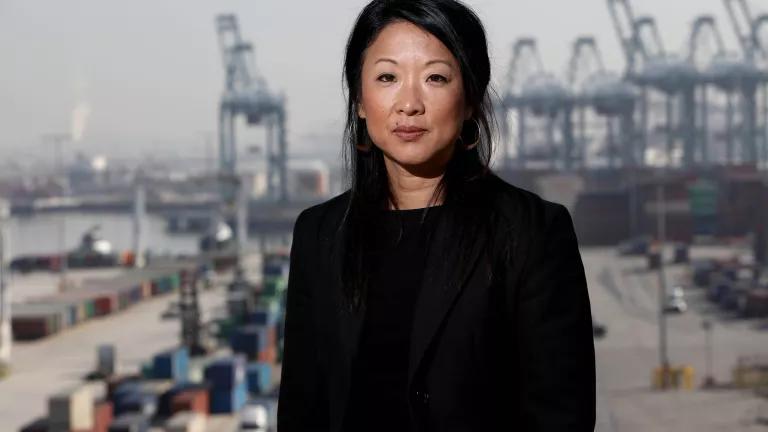
Melissa Lin Perrella, NRDC’s chief equity & justice officer, at the Eastview Little League baseball fields near the Port of Los Angeles in San Pedro, California, February 14, 2020
If you were to go back in time and visit Melissa Lin Perrella’s childhood home in Dixon, California, you’d notice a few things. In the living room, you’d hear the stories her Chinese-immigrant family shared—like the one about her grandmother, who was not allowed to go to school in China because she was a girl and who taught herself how to read and write by sitting next to her brother while he did his lessons.
In the kitchen, you’d find cupboards overflowing with repurposed plastic containers, glass jars, and coffee tins ready for reuse. Her parents also grew their own vegetables and fruit and found a purpose for almost everything. For example, they made soy milk from scratch and used the leftover soybean husks as fertilizer. Those choices were less about being green and more about history. “Both of my parents had experienced poverty in their lifetime, so the idea of conservation in our home was always a priority,” she says. “To waste was to be ungrateful.”
Unfortunately, living in a predominantly white small town meant a lot of the family’s background and culture were scrutinized or stereotyped, something Lin Perrella was acutely aware of. Occasionally, strangers on the street would stop her to ask, “Where are you from?” She recalls that she struggled with a sense of acceptance from her white peers and from the teachers who couldn’t seem to understand that “Lin” was her last name (not a middle name). “As a kid, I wanted to look like everyone else and not be noticed,” she says. “That's really hard to do when you look very different from everyone else and your house smells different from everyone else’s because the food you eat is different, and the accent that your parents have is different from everybody else’s.”
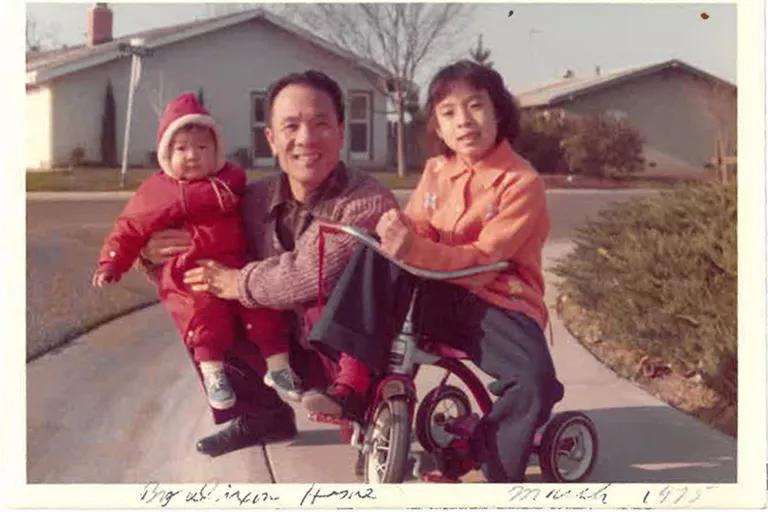
It wasn’t until she turned 13 and her family moved to a neighborhood in Sacramento with a significant Asian American population that she began to feel a sense of belonging. Today, she credits these early life experiences of grappling with racial identity with teaching her about concepts of inclusivity, as well as what it feels like to be “marginalized.” By college, that understanding began to shape her path toward justice-centered work.
After two years at community college, Lin Perrella transferred to the University of California, Berkeley, where she focused on a degree in social welfare and also took classes in African American, Chicano, and Asian American studies. This coursework sparked her decision to double major in ethnic studies. “I appreciated learning history from a non–white centered point of view,” she says. “I loved the concepts of justice that were introduced, the stories of movement building, and seeing people who looked like me fighting for change. I think that's when I started becoming interested in going to law school.”
Lin Perrella got her JD from Georgetown Law in Washington, D.C., and did a brief stint in corporate law before realizing she was better suited for public interest law. In 2004, she accepted a position as a clean air attorney at NRDC in the Santa Monica, California, office. Lin Perrella was eager to work on public health issues, like air pollution. She remembers learning in her interview that NRDC and local partner groups had recently won a landmark lawsuit, the China shipping case, which ruled that the city of Los Angeles violated state law by failing to assess the pollution, traffic, and other harmful effects of a proposed shipping terminal before approving its construction. She took the job with the understanding that she would be doing similar health and advocacy litigation. “I had no idea when I applied for the position that this job was perfect for me. It integrated what I had studied in undergrad, my values, and what I cared about—most of what drove me to law school in the first place,” she says.
Not long after she began at NRDC, Lin Perrella also came to an important understanding: It was critical to partner with environmental justice (EJ) communities. That was how one built the necessary power to force social change and ensure policies were responsive to community needs. Environmental justice communities are low-income communities and communities of color that have more of the bad stuff, like air and water pollution, and less of the good stuff, like healthy food, parks, and public transportation, she explains. (It’s now indisputable that those communities are disproportionately more likely to breathe the dirtiest air.)
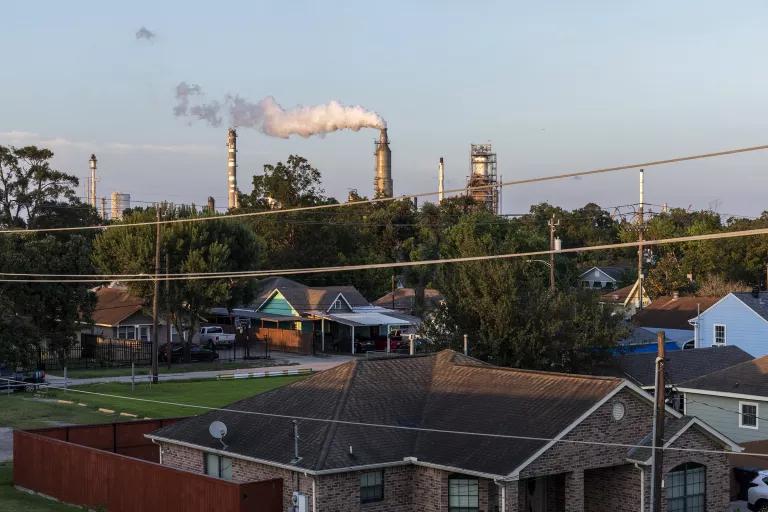
As an air pollution attorney, Lin Perrella worked with communities that experience the worst pollution in Los Angeles and Long Beach, and supported local advocates fighting to protect the health of their families and the communities they love. “Getting to work alongside these community leaders has been the greatest reward,” she says.
One example that stands out is the Clean Truck Program, which had an ambitious goal to modernize nearly 17,000 old diesel trucks that visited the Port of Los Angeles and the Port of Long Beach every day. Their toxic diesel emissions fouled the air that local communities were breathing—surrounding neighborhoods had a heightened cancer and respiratory illness risk and a 20 percent childhood asthma rate.
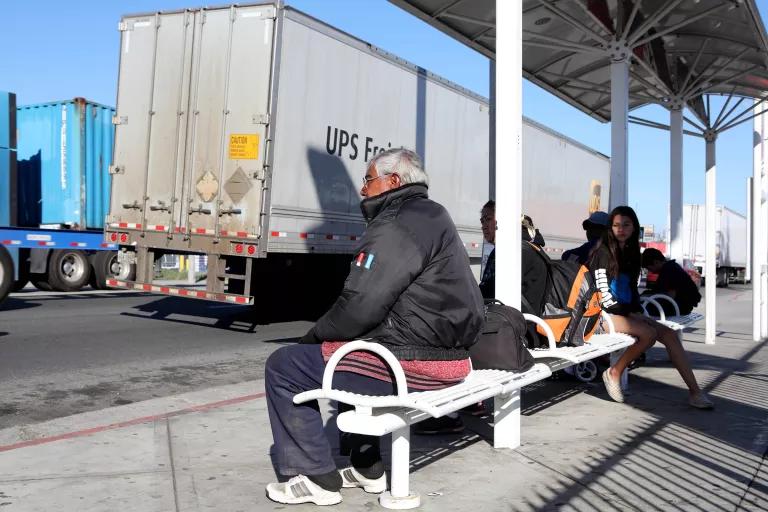
Starting in 2007, Lin Perrella worked with a coalition of local labor groups, environmental justice advocates, and environmental organizations to develop and push the program through. When it was challenged in court by the American Trucking Associations, NRDC helped defend it in a case that went all the way to the Supreme Court. “There's lots of nuance: We won on some issues, we lost on others, but we helped defend some of the important parts of that program and there were real health benefits on the ground for the community,” Lin Perrella says.
The Clean Truck Program reduced air pollution from harbor trucks by 90 percent, which improved health outcomes for residents and for workers moving goods. But more remained to be done to meet clean air standards, protect public health, and address health disparities. That push for progress continues today, more than a decade later, largely through the tenacity of community residents. Meanwhile, NRDC has played an important role in part through building strong relationships and providing legal and technical support. “When the work of a few becomes the vision of many, that's when change happens,” Lin Perrella says.
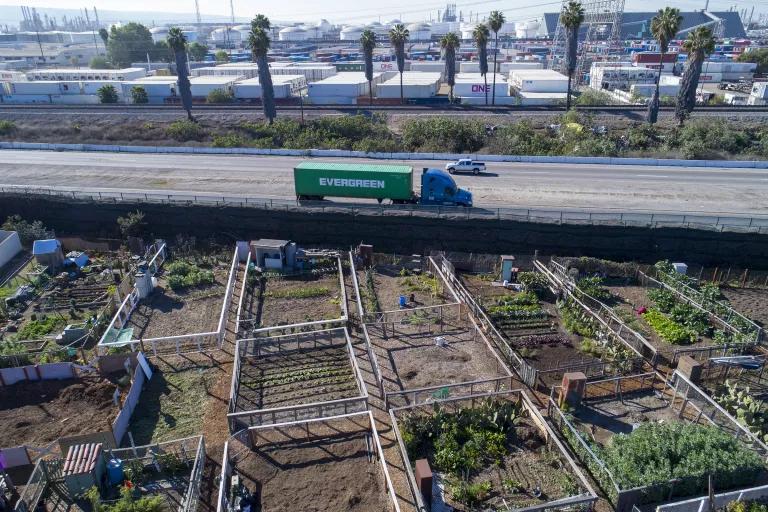
In 2018, Lin Perrella was tasked to lead NRDC’s environmental justice team. Under her leadership, the team took a holistic approach to their work—not only were they committed to advancing justice issues outside of the office walls with partners, but they also strove to make a difference internally. “In order for us to be good partners to EJ communities, we also needed internal culture change,” she says. “We needed a deeper understanding of equity and justice, and a commitment to advancing those values in not just what we work on but how we do our work.” This is why she continues to advocate for a broadening of NRDC’s fundraising goals to ensure that coalition partners have the resources they need to achieve collective success.
More recently, in the summer of 2021, Lin Perrella became NRDC’s first chief equity & justice officer and is now leading the newly created Environment, Equity & Justice Center (EEJC). The center will serve as a centralized resource to help the organization advance community-driven solutions in partnership with frontline communities. “Melissa's leadership has been really instrumental in this ongoing evolution from expanding EJ partnerships that were held by individuals or small teams to having more institutional levels of partnerships,” says Ramya Sivasubramanian, managing director of environmental justice and community solutions for the EEJC. “In her new role, she's going to be incredibly well poised to continue supporting the institution in being able to build and deepen those relationships—and expand our focus on equity and justice more fully across the institution.”
Lin Perrella knows the work is a long journey. She also admits that there’s no perfect recipe for creating culture change outside and inside an organization—but doesn’t allow that uncertainty to become paralyzing. “I read somewhere that if you want to create social change and are waiting until everything is perfectly aligned before acting, then you're waiting too long. By that point, the movement doesn't need you anymore.”
Lin Perrella, a lifelong runner, has conquered eight marathons and logged more trail runs than she can count. So running a marathon is an easy, go-to metaphor for what she does in partnership with EJ communities. But perhaps a more apt description is a relay race: “This work isn't about any single person or organization,” she says. “If I can follow those who came before me and move things forward a little more so that the next group can keep moving toward justice, I will act on that opportunity.”
This NRDC.org story is available for online republication by news media outlets or nonprofits under these conditions: The writer(s) must be credited with a byline; you must note prominently that the story was originally published by NRDC.org and link to the original; the story cannot be edited (beyond simple things such as grammar); you can’t resell the story in any form or grant republishing rights to other outlets; you can’t republish our material wholesale or automatically—you need to select stories individually; you can’t republish the photos or graphics on our site without specific permission; you should drop us a note to let us know when you’ve used one of our stories.
The Particulars of PM 2.5
America’s Failing Drinking Water System
The Lower Klamath River Will Soon Flow Freely Again